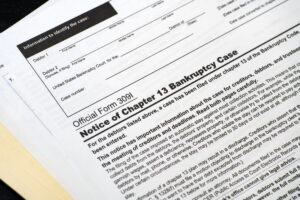When you file Chapter 13 bankruptcy, you have to propose a plan that shows the court, trustee, and your creditors who will get paid during the course of your plan. The court will mail out the plan, along with the notice of your bankruptcy, to all of the creditors that you list on your petition.
As a bankruptcy attorney, my job is to reduce my client’s payment to unsecured creditors to as little as possible. The trustee’s job is to get the payment as high as possible. Secured creditors want to make sure that their collateral is protected.
Given the varying interests involved, it’s normal for Chapter 13 plans to receive at least one objection, usually from the trustee. The trustee may object to the amount of a monthly expense the filer has taken or that priority debts, like taxes or child support, haven’t been fully taken care of.
Objections to the plan are due about a month after the case is filed. It’s my job to address all of the objections. Resolving an objection may take as little work as providing documentation that supports a monthly expense or it may involve arguing to the court that such an expense is allowable, or that the objection is not supported by the facts.
From time to time, an evidentiary hearing may be required to resolve an objection. That can sometimes require a filer to testify in court. While rare, I would expect that only an experienced attorney can tell you whether or not you can expect that in your case.
Once all objections are resolved, another plan must be sent to creditors who then have another chance to object to the amended plan. Hopefully, all objections have been resolved, but it can sometimes take two, even three, amendments to fully address all of the objections. This is a normal part of the Chapter 13 process, and you shouldn’t be too concerned when the court issues an order denying the confirmation of your original plan. Again, an experienced attorney should be able to prepare you for any bumps in the road she expects.
If you have questions about the Chapter 13 bankruptcy process and whether it might be a good option for you, we hope you’ll come in for a free, confidential consultation with an experienced Colorado bankruptcy lawyer. You can schedule an appointment by calling 303.331.3403 or by using our online scheduling system.
More helpful articles:
How Does Chapter 13 Bankruptcy Work?
Can I Get Rid Of A Second Mortgage In Chapter 7 Bankruptcy?
What Is The Difference Between Chapter 7 And Chapter 13 Bankruptcy?



